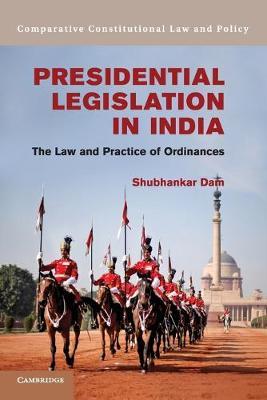Overview
India has a parliamentary system. Yet the president has authority to occasionally enact legislation (or ordinances) without involving parliament. This book is a study of ordinances at the national level in India, centred around three themes. First, it tells the story of how an artefact of British constitutional history, over time, became part of India's legislative system. Second, it offers an empirical account of the ways in which presidents have resorted to ordinances in post-independence India. Third, the book analyses a range of ordinance-related questions, including some that are yet to be judicially adjudicated. In the process, the book explains why much of India's Supreme Court's jurisprudence is mistaken, and what should take its place. Overall, the book explains why the fate of parliamentary reforms in India may be tied to the reform of this provision for ordinances. Presidential Legislation in India offers a new frame through which to assess the executive's legislative powers both in parliamentary and presidential systems.
Full Product Details
Author: Shubhankar Dam (Singapore Management University)
Publisher: Cambridge University Press
Imprint: Cambridge University Press
Dimensions:
Width: 15.20cm
, Height: 1.50cm
, Length: 25.20cm
Weight: 0.416kg
ISBN: 9781107546028
ISBN 10: 1107546028
Pages: 278
Publication Date: 30 July 2015
Audience:
Professional and scholarly
,
College/higher education
,
Professional & Vocational
,
Tertiary & Higher Education
Format: Paperback
Publisher's Status: Active
Availability: Manufactured on demand

We will order this item for you from a manufactured on demand supplier.
Reviews
This book is essential reading for anyone interested in constitutionalism, the rule of law and Indian democracy. It lays out a detailed analysis of the ordinance-making power of the Indian President and a vigorous argument for a reappraisal of its interpretation and use. Challenging the apparent clarity of the constitutional text, and invoking deeper arguments of constitutional principle, it bravely rejects the widespread assumption that legislation and ordinances are equivalent and highlights the exceptional and deeply problematic nature of the President s power to enact legislation. Simon Evans, University of Melbourne
'Dam is among the rising stars in the jurisprudential study of Indian law. The analysis in this important book demonstrates how India's executive has repeatedly enacted economic and social policies by bypassing parliament, and the institutional perils of doing this. Relevant to understanding the current economic situation brought about by executive action, the book must be read by all policymakers and scholars interested in India.' Jagdish Bhagwati, University Professor of Economics, Law and International Affairs, Columbia University 'This book is essential reading for anyone interested in constitutionalism, the rule of law and Indian democracy. It lays out a detailed analysis of the ordinance-making power of the Indian President and a vigorous argument for a reappraisal of its interpretation and use. Challenging the apparent clarity of the constitutional text, and invoking deeper arguments of constitutional principle, it bravely rejects the widespread assumption that legislation and ordinances are equivalent and highlights the exceptional and deeply problematic nature of the President's power to enact legislation.' Simon Evans, University of Melbourne Dam is among the rising stars in the jurisprudential study of Indian law. The analysis in this important book demonstrates how India's executive has repeatedly enacted economic and social policies by bypassing parliament, and the institutional perils of doing this. Relevant to understanding the current economic situation brought about by executive action, the book must be read by all policymakers and scholars interested in India. Jagdish Bhagwati, University Professor of Economics, Law and International Affairs, Columbia University This book is essential reading for anyone interested in constitutionalism, the rule of law and Indian democracy. It lays out a detailed analysis of the ordinance-making power of the Indian President and a vigorous argument for a reappraisal of its interpretation and use. Challenging the apparent clarity of the constitutional text, and invoking deeper arguments of constitutional principle, it bravely rejects the widespread assumption that legislation and ordinances are equivalent and highlights the exceptional and deeply problematic nature of the President's power to enact legislation. Simon Evans, University of Melbourne
Author Information
Shubhankar Dam is an Assistant Professor of Law at Singapore Management University School of Law. He graduated from the University of Oxford (BCL) as a Felix Scholar, and from Harvard Law School (LLM) as a Harvard University Dana Scholar. He has held visiting positions in universities and research institutions in Australia, India, and Germany. His research interests are in the fields of law and governance in India and comparative constitutional law, and he has published in journals from Australia, India, The Netherlands, Singapore, the United Kingdom, and the United States.




